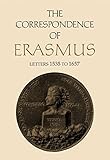The Correspondence of Erasmus : Letters 1535-1657, Volume 11 / Desiderius Erasmus.
Material type: TextSeries: Collected Works of Erasmus ; 11Publisher: Toronto : University of Toronto Press, [1994]Copyright date: ©1994Description: 1 online resource (476 p.)Content type:
TextSeries: Collected Works of Erasmus ; 11Publisher: Toronto : University of Toronto Press, [1994]Copyright date: ©1994Description: 1 online resource (476 p.)Content type: - 9780802005366
- 9781442680975
- 199/.492 22
- PA8511.A5 E55 1974 v.11eb
- online - DeGruyter
| Item type | Current library | Call number | URL | Status | Notes | Barcode | |
|---|---|---|---|---|---|---|---|
 eBook
eBook
|
Biblioteca "Angelicum" Pont. Univ. S.Tommaso d'Aquino Nuvola online | online - DeGruyter (Browse shelf(Opens below)) | Online access | Not for loan (Accesso limitato) | Accesso per gli utenti autorizzati / Access for authorized users | (dgr)9781442680975 |
restricted access online access with authorization star
http://purl.org/coar/access_right/c_16ec
The Peasant's War in Germany and his own ill-health combined to keep Erasmus confined to the city of Basel during 1525, but he was still able to maintain an active correspondence spanning all of Europe. In the preceding year, he had published De libero artbitrio/Freedom of the Will, his first open attack on the teachings of Martin Luther. Despite this public defence of Catholic doctrine, Erasmus was continually forced in his correspondence to reply to open or veiled attacks by Catholic critics.Erasmus directly addressed one of his critics, No+l BTda, of the Paris theological faculty, in the spring of 1525. BTda was preparing analyses of Erasmus' publications that would eventually form the basis for a formal condemnation. Erasmus' correspondence with BTda, intended to head off such a condemnation, continued past 1525 and became increasingly hostile in tone. That same year, Erasmus also followed up reports that an influential Italian humanist, Alberta Pio, Prince of Carpi, was circulating at the papal curia a manuscript accusing Erasmus of being the major source of Luther's errors. Again, he directly addressed his opponent in order to prove his orthodoxy and to urge (in vain) that no such attack be published. In both cases, however, despite his break with Luther and his public and private opposition to the Protestant leader Oecolampadius in Basel, he was unsuccessful in turning aside the hostility of his Catholic critics.
Mode of access: Internet via World Wide Web.
In English.
Description based on online resource; title from PDF title page (publisher's Web site, viewed 01. Nov 2023)


